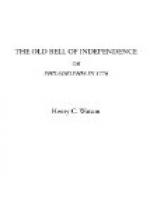“Why didn’t each man stay at home, and take care of his own house?” enquired Mrs. Harmar.
“Of what use would that have been?” returned old Harmar. “By so doing, they could not have saved any house, and would have lost the chance of punishing the red-coats for their outrages. I forgot to tell you, though, that some of the farmers had brought their wives and children to Bates’, and these were all put up-stairs out of the way. The little garrison had made loop-holes on all sides of the house, and each man had his rifle and knife ready to guard the post at which he was stationed. John Bates was the captain, because he knew most about such fightin’ matters; he learned it of Marion. Well, at last the garrison caught sight of the Britishers coming up steadily, the leader a little in advance. They didn’t seem to suspect that any body was in the house, for they had found all the rest deserted. Still they thought it wise to be careful. They surrounded the house at their leader’s command, and were getting their things ready to set fire to it, when the garrison, who had kept still as death all the time, blazed away at them from all sides. This staggered the whole party; four or five of their number were shot dead, and as many more wounded. They rallied, however, and poured a volley into the house. The garrison, under John’s command, returned the fire, and seemed to have decidedly the best of the matter. Joe’s wife couldn’t content herself up-stairs with the women and children. She wanted to be of some use in defending her own house. She would come down and load the guns for John, while he kept a look-out on the movements of the British party. Well, she had just loaded the gun, and was handing it to John, when a bullet whizzed past him, struck her in the breast, and she fell dead. John Bates looked through the loop-hole, and caught sight of one of the red-coats running back from the house, and fired at him but missed. He saw the man’s face, though, and remembered




